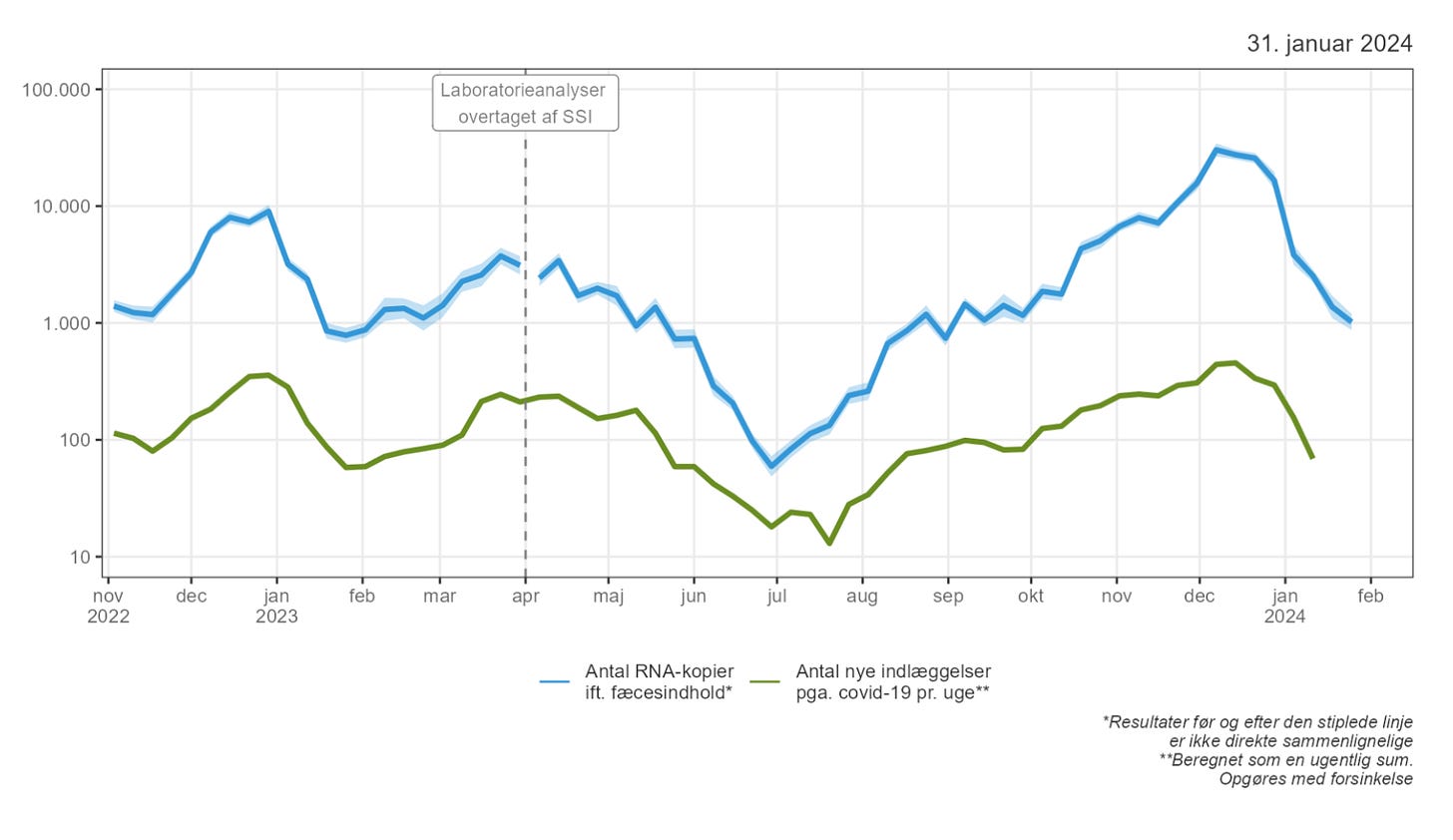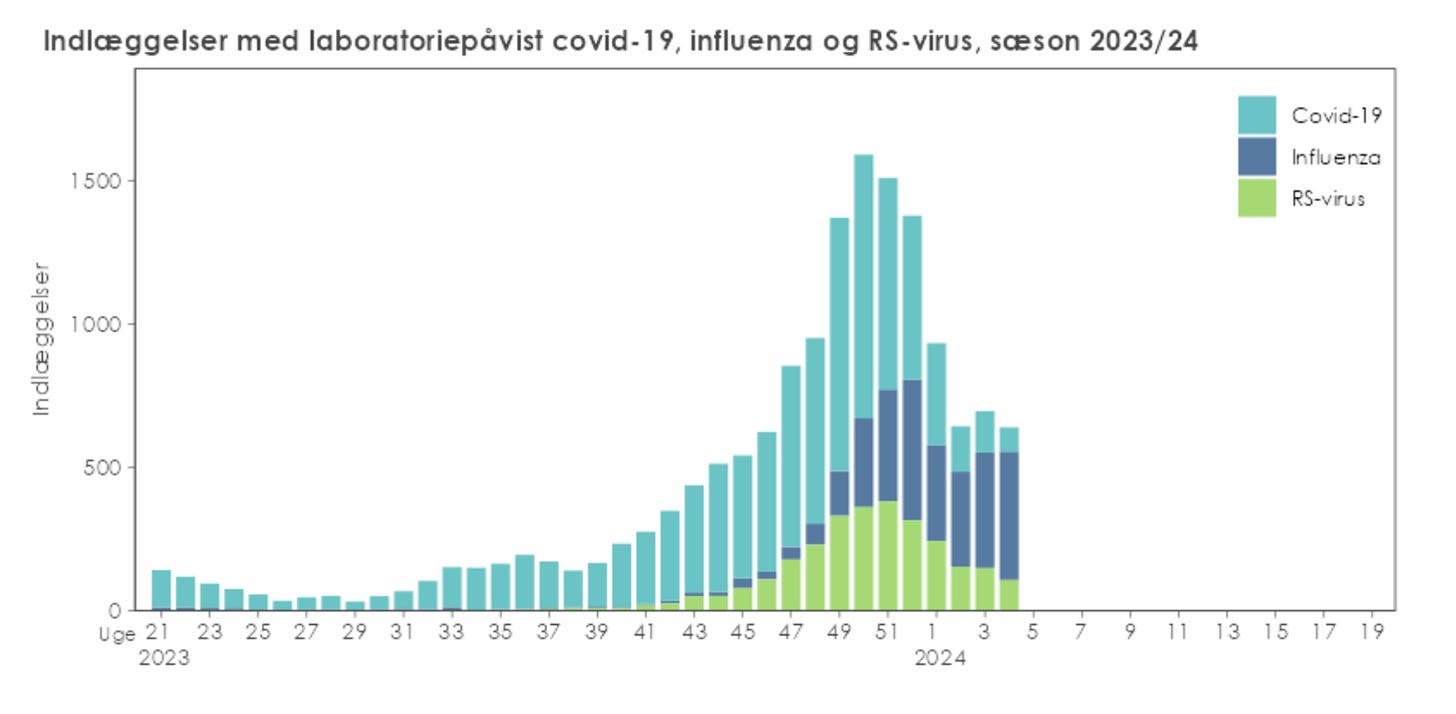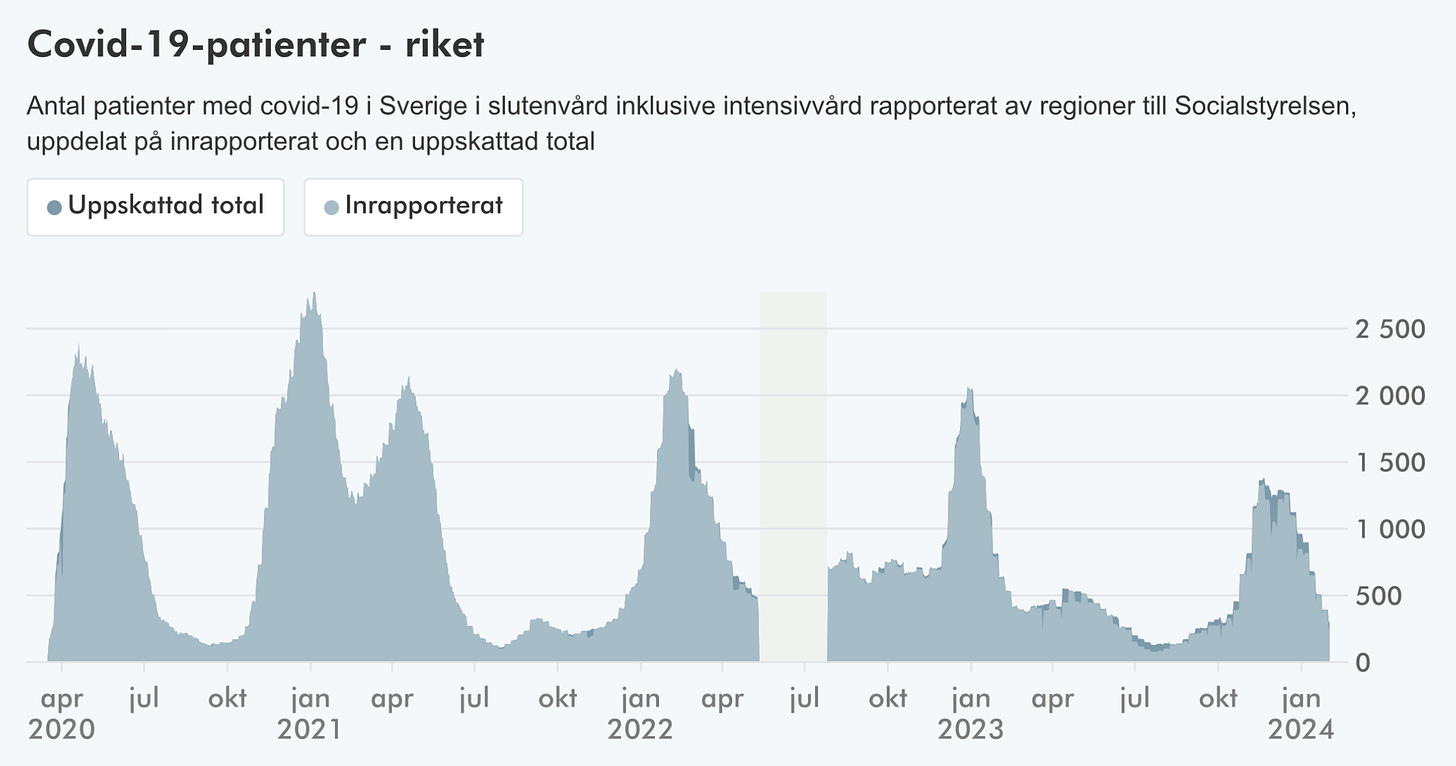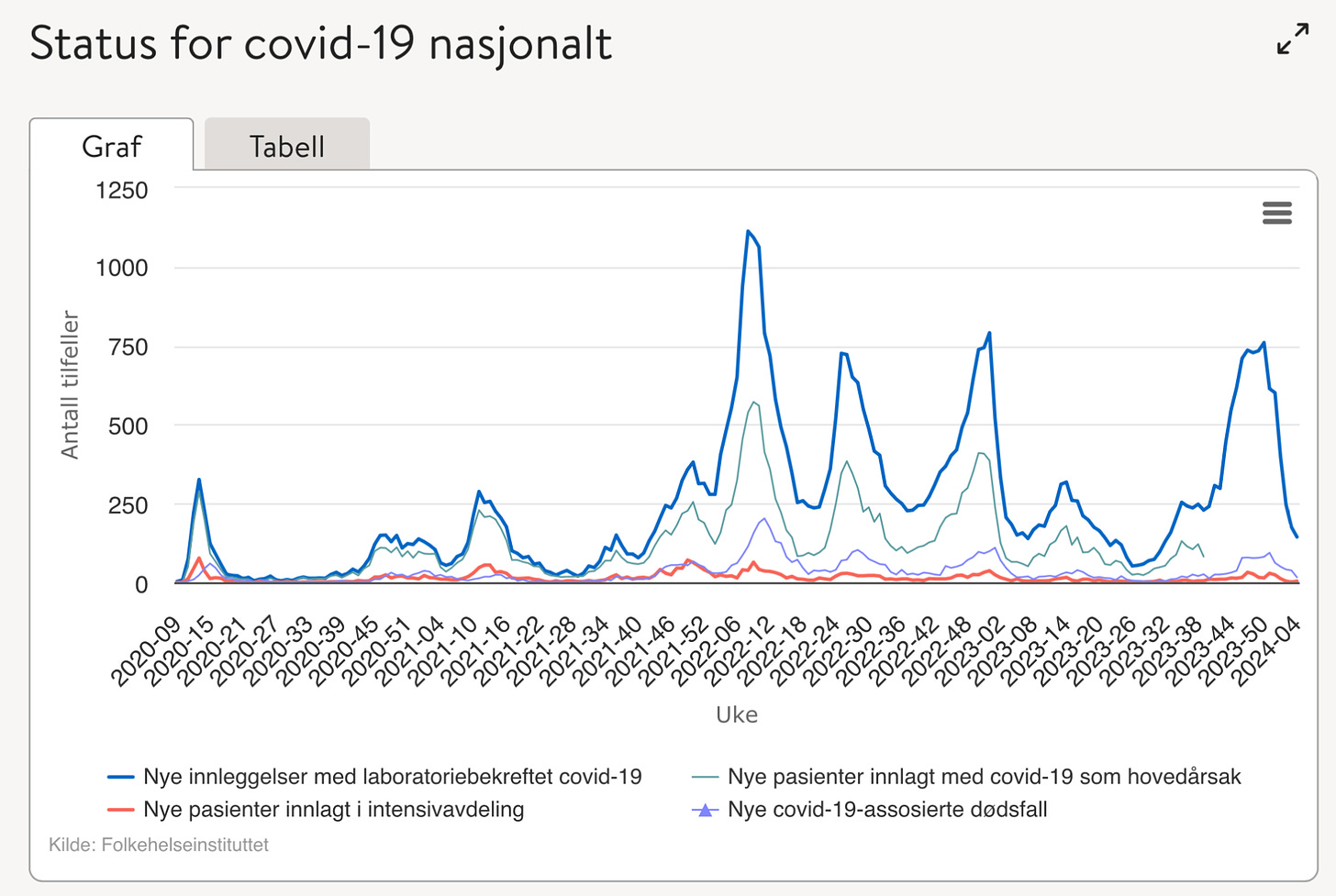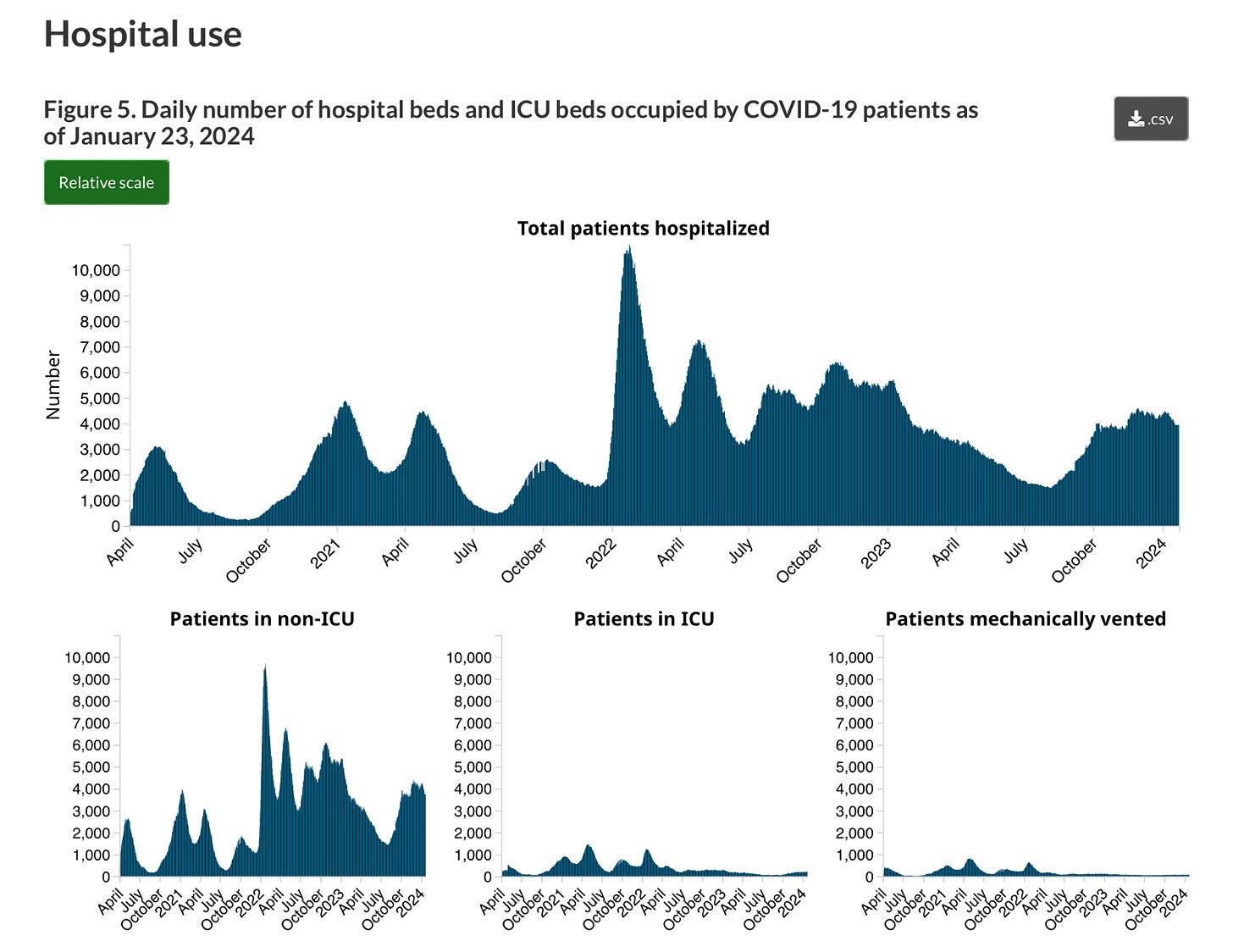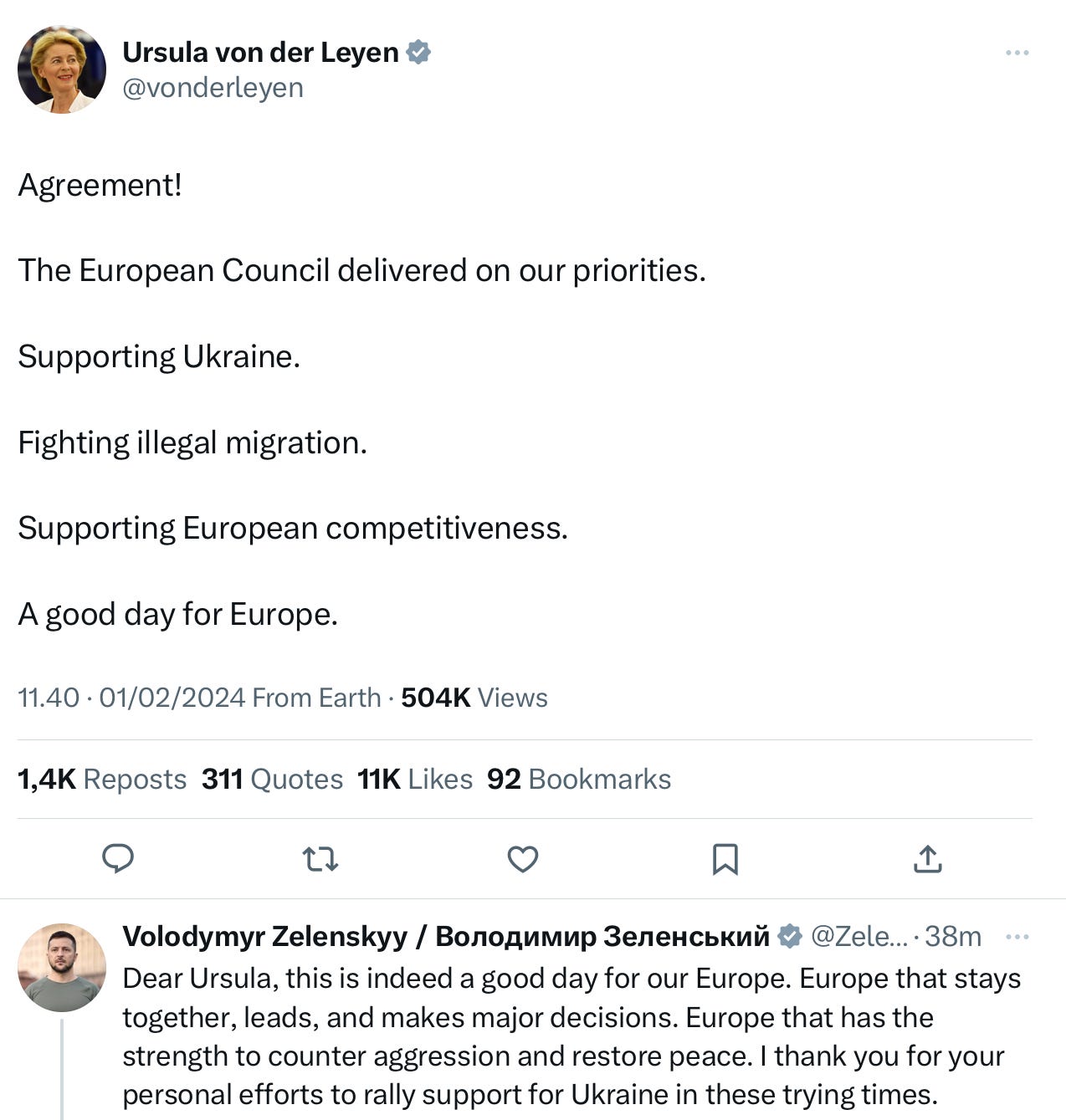🚨Measles🚨
There has been a confirmed measles case “with suspected infection in Denmark” according to the Statens Serum Institute. The SSI says an unvaccinated adult who lives in Sjælland has measles but the person was in Copenhagen while they were infectious.
The institute says the person hasn’t traveled outside the country but has had “professional contact” with people “from areas with known measles circulation.”
Doctors, especially those in Region Sjælland and in Copenhagen, have been asked to a sharp eye out for any other suspected measles infections.
🚨Travel Alert🚨
For anyone going to Thailand to escape the dreary Danish winter, be careful. The Statens Serum Institute says there has been a flare-up of Zika virus in Thailand. The number of confirmed cases last year was up 300% in Thailand with the institute saying 16 infections linked to Thailand have been identified across the EU.
“SSI estimates that there may currently be an increased risk of infection with the Zika virus when traveling to Thailand, although the absolute risk for the individual traveler is low given the high number of travelers.”
The agency advises people traveling to Thailand to keep themselves as safe as possible, especially pregnant women.
🍃Environment & Energy⚡️
🇳🇴 🇸🇪
Norway and parts of Sweden are being hit with hurricane-force winds as Storm Ingunn rolls through the Nordics. The intense wind has already caused damages tearing roofs of houses and at least one hospital in Norway. Police are urging Norwegians to stay at home and off the roads.
🇩🇰
“Blood Rain" stains Denmark. If you are wondering why your car looked a little dustier after this week’s rainfall; it was a taste of the Sahara! Dust and sand particles from the African desert turned raindrops into what has been dubbed "blood rain," leaving a reddish hue on surfaces as the raindrops passed through the layer of drifting Sahara sand dust. The warm air, hitching a ride from the Sahara to Denmark, set temperature records across Europe along the way, including a new January high in Scotland. While Denmark experienced above-normal temperatures, the lack of mountains meant the heat wasn't as intense. This weather phenomenon isn't unusual, but the unique dusty rain is a reminder of the Sahara's influence on Denmark's weather. The dusty air bid adieu to Denmark on Wednesday as it headed eastward, leaving behind a tiny taste of the African desert.
-
If the municipality's instructions in the environmental approval for Nordic Waste had been followed, the landslide of toxic soil probably would not have happened. That is the conclusion of a legal inquiry initiated by Randers Municipality. Environmental lawyer Jacob Brandt presented the findings at a press conference this week emphasizing Nordic Waste's objective liability under the Environmental Protection Act, irrespective of potential shortcomings in the municipality's supervision.
Following the findings of the legal investigation, Randers Municipality is now set to conduct an in-depth investigation into its own environmental management practices over to the Nordic Waste debacle. The decision follows the unveiling of findings from a legal investigation initiated by the municipality, revealing shortcomings in its own environmental supervision system.
"Our system of supervision has not been satisfactory and has not lived up to good administrative practice."
The municipality's environmental oversight came under scrutiny last week when it was revealed that reports from their physical inspection of the Nordic Waste site were not published on the Danish Environmental Protection Agency's digital portal for a six-year period. This failure to comply with obligatory reporting procedures has drawn criticism from the Danish Environmental Protection Agency and experts alike.
Since the landslide, Nordic Wasteland first abandoned the site and then declared bankruptcy sparking concern about who will be left to hold the bill. The municipality continues to work around the clock to avert disaster to the tune of about three million Danish kroner (about $585,000 Cdn) each day. The slide of toxic soil threatens to spill into a nearby stream and swamp the town of Ølst.
-
The woes facing Nordic Waste continue to mount as the East Jutland Police have confirmed the company has been reported to them by Rangers Kommune.
“We will now review the report and assess what should happen next. We are aware of the great public interest in the case, but we do not have any further information at this time.”
Randers Municipal Manager Jesper Kaas Schmidt says following a decision by city council the municipality has reported four violations against Nordic Waste to the police.
-
Denmark is grappling with the aftermath of torrential January rains, leaving large swaths of fields submerged and crops ruined. Farmers, including Henrik Nordgaard Hansen in Brandelev east of Næstved, told DR that the scene at his farm is like nothing he has ever seen before. Hansen, with three decades of farming under his belt, said it is astonishing.
“Even high-lying fields have been underwater with the amounts we got after New Year."
Many farmers are witnessing their fields being transformed into lakes, a sentiment echoed by Anders Nielsen, a plant breeding consultant at the East Danish Farmers' Association.
"There is a lot of water in the fields, and unfortunately also in places where there has never been water before."
The deluge poses a significant threat to agriculture, impacting not only winter cover crops but potentially disrupting the upcoming growing season as well, highlighting the challenges brought about by extreme weather events in Denmark.
-
It was supposed to be tabled in 2022 but the Danish government is taking its time in unveiling its CO2 tax on agriculture. The report, which will make recommendations for how to structure the agricultural emissions tax, will finally be unveiled on February 21 according to the Danish Ministry of Taxation.
Michael Svarer is the Chair of the Expert Group behind the report. He spoke to Ritzau:
“So we consider that it is more appropriate to present it on the other side of the winter holidays in order to meet the demand from all the stakeholders.”
In Denmark, there is a traditional winter holiday week taken in February on either the second or third week of the month.
-
A record number of people used the Metro in Copenhagen last year. According to Metroselskabet 120 million people used the metro system to get around the city last year. That is the highest passenger numbers in the metro’s history. Public transit numbers plummeted across Denmark during the COVID pandemic but since restrictions were lifted and society returned to near normal passengers have been flooding back to public transit.
-
Lackluster snow removal in Odense has left the city holding a hefty bill. After a flood of complaints and injuries, the city did a post mortem of its response during the snowfall in the early January cold snap. The conclusion? The response was inadequate. Worse yet, there were 114 accidents on streets and paths directly caused by not clearing the snow faster. Odense University Hospital pegs the cost of those accidents for city taxpayers at about seven million Danish kroner (roughly $1.3 million Cdn).
To remedy the situation the city wants to buy more snow clearance equipment and buff up its winter weather preparedness.
-
Aalborg University Hospital rejects vegan menu despite opposition. The hospital remained resolute in scrapping its vegan menu, as the North Jutland regional council decisively voted against reinstating plant-based options as part of a cost-cutting plan.
Enhedslisten's Susanne Flydtkjær expressed disappointment when speaking to DR:
“Hopefully one day it will become clear that, of course, you can offer a plant-based meal to the patients who want it."
Only two Enhedslisten members and a lone Social Democrat voted in favor of reversing the hospital's decision, sparking concerns about the institution's responsiveness to patients, and even staff, who prefer a vegetarian diet.
🇬🇱
Greenland is not a methane gas threat, but rather a methane sink according to a new study. Contrary to previous concerns, Greenland is not a ticking climate bomb, but rather consumes more methane gas than it emits, according to a study by the University of Copenhagen's Department of Geosciences and Natural Resource Management. The research was published in Nature Communications Earth & Environment. It found that dry landscapes in the ice-free regions consume over 65,000 tons of methane from the atmosphere annually, while wet areas release 9,000 tons of methane. Unique groups of microorganisms that typically live in the upper half meter of arctic soil facilitate methane uptake, converting it into less potent carbon dioxide. Although Greenland's global methane impact is minor, the study provides valuable insights into Arctic methane dynamics.
Researcher, and First Author of the study, Ludovica D'Imperio:
“Our work also sheds light on the conditions that, in addition to the climate, are crucial for methane uptake in Greenland. Based on our statistical model, we can conclude that it depends on the presence of the right microorganisms, soil acidity and copper, knowledge that we were previously uncertain about.”
While carbon dioxide is also a well-known greenhouse gas, its greenhouse gas effect is a lot less strong than methane, making the conversion of methane to carbon dioxide good climate news.
🇫🇮
Finland considers a ban on dumping snow into the sea in order to protect the marine environment. The Finnish Ministry of the Environment is proposing an amendment to the Environmental Protection Act that would prohibit the dumping of snow into the sea. The move, part of the government's initiative to enhance water quality, aims to address the environmental impact of snow disposal, which often includes sand, cigarette butts, and microplastics. Although not widespread, some urban areas, like downtown Helsinki, currently employ the dumping of snow into the sea. The government's bill is expected to be presented in April.
-
Finland's wind turbines churned out a record amount of electricity generation level last Monday, propelled by strong winds. Finnish power grid operator Fingrid said the turbines produced approximately 6,070 megawatts of electricity, sustaining an impressive average power output of 5,940 MW from 7-8 am. The wind power surpassed the output of even nuclear power facilities, which averaged around 4,370 MW, the wind-generated electricity also outstripped the power demand for the entire country that day. Fingrid noted a surplus as production exceeded 13,000 MW while consumption stood at around 11,800 MW. Despite a subsea cable fault limiting exports, Finland exported electricity to neighbouring countries, highlighting the potential for further records.
🇩🇰 🇳🇱 🇬🇧
Recent setbacks for the Cobra cable, a subsea power interconnector between the Netherlands and Denmark, have unexpectedly paved the way for positive developments in the Viking Link, a crucial undersea power line between the UK and Denmark that came online in December. With the Cobra cable facing outages since mid-January, the Viking Link has seen an opportunity to surpass established thresholds, ensuring a boost in electricity flows and potentially strengthening Denmark's energy security.
Originally capped at 800 MW to ensure energy security, Viking Link's increased power dispatch, now exceeding one gigawatt, helps Denmark while reducing the UK's reliance on gas-powered output, contributing to lowered CO2 emissions.
As energy dynamics shift, the unexpected synergy between the Cobra cable's challenges and the Viking Link's capabilities highlights the interconnected nature of European energy infrastructures and the potential for adaptability in ensuring a sustainable and secure power supply.
🇩🇰🇪🇺
Ambitious wind farm project faces demise due to EU nature protection laws. Europe's green transition faces a setback as the decade-long dream of energy company European Energy to build a wind farm south of Omø in the Smålandsfarvandet, a large inlet between the Danish island of Langeland and Lolland, may be on the verge of collapse. The wind farm, intended to power 350,000 households, encountered a major obstacle when the area was declared a nature area covered by EU protection laws. Despite having Environmental Impact Assessment approval since 2020, European Energy's offshore wind director, Andreas Karhula Lauridsen, expressed pessimism about the project's future. The protected status makes it exceedingly challenging to navigate EU regulations, highlighting the challenging balance between green energy ambitions and nature preservation in Europe's sustainable journey.
🇳🇴
Norway's national oil and gas fund reached a staggering 16,000 Billion Norwegian kroner (roughly $2.4 trillion Cdn), a global investment behemoth. With a colossal valuation the state-owned Government Pension Fund Global, also known as the Oil Fund has become the world's largest single owner of publicly listed shares. Fueled by Norway's substantial oil and gas revenues, the fund experienced a remarkable 16.1% return in 2023. Notably, technology stocks, including investments in giants like Apple, Microsoft, and Google's parent company, Alphabet, contributed significantly to the fund's impressive performance. The Norwegian Investment Fund was established in the 1990s to invest Norway's foreign income from gas and oil.
🇪🇺
The European Union is hoping to appease angry farmers as tractor protests make life miserable in France and other European countries. Addressing the recent protests, the European Commission introduced new measures, including the potential limitation of agricultural imports from Ukraine if member states identify adverse economic impacts. EU Commissioner Margaritis Schinas acknowledges concerns and emphasizes a proactive approach to address sensitive issues raised by farmers. Additionally, the Commission proposes allowing farmers to cultivate fallow land this year without affecting their agricultural support. The decision to implement these measures rests with individual member states. The moves aim to find a balance between farming policies, climate change initiatives, and addressing the frustrations expressed by the agricultural sector.
🇬🇷
Greece, now the third European country impacted by Houthi attacks on tankers in the Red Sea, faces a setback in its ambition to become a gas hub in Europe. At least three LNG shipments from Qatar that would have traversed the Red Sea have now been cancelled. The cancellations, a consequence of disrupted shipping routes due to attacks by Houthi rebels, are raising concerns about the sustainability of European-Qatari LNG trade dynamics.
Greece, once a significant Russian gas importer, shifted to LNG after Russia invaded Ukraine. Despite investments in new LNG terminals cancellations of inbound LNG shipments pose challenges to its energy security, emphasizing the need for alternative LNG sources while the Red Sea remains closed.
-
The mayor of Athens has unveiled a plan to help cool the city amid increasing summer heat. Mayor Haris Doukas has announced an initiative to plant 25,000 trees over the next five years to combat soaring temperatures and pollution in the city center. The strategic placement of these trees aims to create shaded routes connecting streets and parks, providing relief for both residents and tourists during the scorching summer months. Doukas believes that this green initiative will enhance the city's livability and improve access to landmarks. Last summer, searing temperatures forced the city to temporarily close the Parthenon ruins on the Acropolis after tourists suffered dehydration and even fainting spells.
🦠COVID🦠
🇩🇰
COVID activity (blue line) continues to decline across Denmark according to the latest wastewater surveillance results. The Statens Serum Institute says there was a “strong decrease” in virus activity last week. Infection-related hospitalizations (green line) also continue to drop.
However, influenza activity is picking up again with infections once again rising. The flu is now responsible for more hospitalizations than either coronavirus or RS virus (chart below).
As influenza season sinks its teeth in across Denmark more and more people are snapping up cold and flu medicine at their local pharmacy. The sale of throat lozenges, painkillers, and nasal sprays, have shot up by 10% across the country.
The SSI says RS virus cases and hospital admissions are in decline. It is the same story for whooping cough infections.
🇸🇪
COVID hospitalizations in Sweden (250) continue to tumble (-140) while the number of intensive care patients (10) rose slightly (+6).
🇳🇴
The RS virus is taking center stage in Norway amid the winter storm of competing respiratory infections. The Norwegian Institute of Health says that influenza infections remain stable after a few weeks of falling numbers while the winter COVID wave is returning.
“It is important that unvaccinated elderly people, people in risk groups and employees of the health service who have not yet been vaccinated get vaccinated as soon as possible. Hospitals and municipalities must still be prepared for respiratory infections and admissions with respiratory infections in the future.”
RS virus infections have “increased rapidly in recent weeks” across Norway. The positivity percentage has risen to 11.9%, an increase of more than two points week to week. Among especially vulnerable infants under the age of four, the positivity percentage is 46.8%. Infection-related admissions have also risen steadily each week with 208 people currently in hospital.
Influenza-related hospitalizations (204) have eased slightly week to week (-9). Norway continues to see a dual flu outbreak with H3N2 and H1N1 strains making the rounds.
“Further developments are uncertain. We cannot rule out another surge towards a second peak in late winter, as has been the case in many previous flu seasons.”
On the COVID front, the number of virus-related hospital admissions (144) has fallen (-31) while there were 4 new intensive care admissions, up from one the previous week.
Another 16 lives were lost to coronavirus last week, down from 38 deaths the week before.
Norway is also seeing a surge in Strep A infections (iGAS). The NIPH says strep cases are increasing particularly among seniors over 70 and among children under 10.
🇺🇸
A new study has found lots of blame to go around in what it determined were thousands of preventable deaths during the pandemic in the United States. The study published in BMJ highlights that thousands of frontline workers in the US could have survived the COVID pandemic if the regulatory system had better protected them. The study, part of a series examining lessons learned from the pandemic, underscores the need for enhanced measures to avert deaths in future outbreaks. The research emphasizes that federal policies focused on supply chain and healthcare facility staff shortages rather than safeguarding frontline workers led to a "perfect storm" in making those workers vulnerable. The study authors are calling for a comprehensive action plan, including new standards, improved workplace protections, universal paid sick leave, updated building codes, enhanced data collection, and congressional support for worker well-being.
Professor at the George Washington University School of Public Health, and Lead Author, David Michaels, PhD, MPH:
“The consequences of these failures were appalling and led to tens of thousands of deaths among frontline workers. The risk of exposure was exacerbated by race, and labour-related economic inequality, resulting in disproportionally more of the nation’s Black and Hispanic workers being killed or sickened by the virus."
🇨🇦
The total number of hospital beds in use by a COVID patient eased somewhat in the weekend ending January 23. But the virus continues to exert a lot of pressure on Canada’s fragile healthcare system.
The total number of beds used to treat an infected patient decreased by 123 to 3,939. General admissions saw most of those declines with 121 fewer patients week to week as patient numbers dipped to 3,730. There were 209 infected people in intensive care across the country, just two fewer than the week before. The number of severely infected people requiring a ventilator continues to remain unchanged at 73.
In its latest weekly update, the Public Health Agency of Canada said that COVID claimed another 119 lives in the last week.
The seven-day positivity percentage continues to ease sitting st 11.4%.
The JN.1 variant remains dominant in Canada accounting for 82% of what few positive tests are still being sequenced.
🇺🇦/ 🇷🇺 War
🇭🇺/ 🇸🇪
Sweden’s NATO dreams may finally come true next week. The Hungarian Parliament has been recalled to sit on Monday and Sweden’s NATO application is on the agenda. What is unclear is if Viktor Orbán’s ruling Fidesz party has anything up its sleeve or not. Hungary remains the last of the 31 NATO member countries that have yet to hold a ratification vote on Sweden’s NATO membership.
🇩🇰🇩🇪🇪🇪🇳🇱🇨🇿
A pledge made by the EU's member states last year to send one million artillery shells to Ukraine by the end of March has fallen significantly short, with reports indicating that only around 600,000 shells will be delivered by the deadline. In an article published in the Financial Times, Danish Prime Minister Mette Frederiksen, alongside German Chancellor Olaf Scholz and other European leaders, acknowledges the shortfall as "the harsh truth" and emphasizes the critical need for accelerated efforts.
Prime Minister Frederiksen put it bluntly, "We can't just run away from our promise," highlighting the urgent requirement for ammunition to sustain Ukraine's defenses, particularly in the face of relentless Russian assaults. Despite EU Commissioner Maroš Šefčovič noting progress in production capacity, the leaders stress the need to expedite the process and live up to their commitment.
“It is actually a question of our common European security. And for the brave women and men of the Ukrainian armed forces, it is a matter of life and death.”
The other European leaders signing the article were Czech Prime Minister Petr Fiala, Estonian Prime Minister Kaja Kallas, and Dutch Prime Minister Mark Rutte.
In response to the criticism, EU Commissioner Thierry Breton said EU member nations already have the capacity to produce one million artillery rounds as promised. He adds that by the end of the year, the EU will be able to churn out 1.4 million artillery rounds annually.
🇪🇺🇺🇦🇭🇺
Hungary relents: Viktor Orbán agrees to allocate €50 billion for Ukraine's defense. In an unexpected turn of events, Hungarian Prime Minister Viktor Orbán, known for his reluctance towards financial aid for Ukraine, has agreed to join other EU member states in allocating a long-delayed €50 billion to support Ukraine in the ongoing conflict with Russia. The decision was announced during an extraordinary EU summit held on Thursday, with Council Chair Charles Michel expressing satisfaction over securing fixed, long-term, and predictable financing for Ukraine.
Previously, Orbán had been the sole European leader to veto the billion-dollar subsidy at the December 2023 summit, sparking concerns of a prolonged and contentious negotiation process. However, a pre-meeting between Orbán and key EU leaders, including French President Emmanuel Macron, German Chancellor Olaf Scholz, and Italian Prime Minister Georgia Meloni, proved to be instrumental in altering Orbán's stance.
The allocated funds are crucial for Ukraine's efforts to continue fighting for its freedom amid the ongoing war. Despite Orbán's historical skepticism and close ties with Russian President Vladimir Putin, the decision marks a significant shift in Hungary's position.
While Orbán initially sought an annual approval process for further grants, the proposal was not supported by other EU leaders. Instead, the council agreed on a mechanism where the European Commission's annual report would serve as the basis for discussions among member states. Orbán's demand for a revision every year was not accepted, but the possibility of revisiting the allocation will be considered in two years.
🇺🇦 🇫🇮 🇩🇰 🇬🇧 🇺🇸
A former Finnish Prime Minister has joined a high-profile task force to boost Ukraine’s security. The International Task Force, features former Finnish Prime Minister Sanna Marin and former Danish Prime Minister and ex-NATO head Anders Fogh Rasmussen, Boris Johnson, and Hillary Clinton. It has been established to help ensure Ukraine’s security and to shepherd it into NATO. The group's inaugural meeting, hosted by Ukrainian President Volodymyr Zelenskyy, focused on crafting a strategy for Ukraine's closer integration with the North Atlantic Treaty Organization. The initiative is in response to the fallout from Russia's invasion of Ukraine, which has significantly impacted the global rules-based order. Anders Fogh Rasmussen highlights the need for a new security architecture for Ukraine, emphasizing long-term commitments, EU membership, and potential NATO inclusion as key pillars. The group aims to evaluate Ukraine's eligibility for NATO membership as part of its key tasks.
🇩🇰
Last summer a broad majority in the Danish parliament agreed on injecting 155 billion Danish kroner (about $30.2 billion Cdn) into beefing up the country’s defense. But Denmark’s Minister of Defense is now saying that more money is already needed.
Coming out of a meeting with EU defense ministers on Wednesday, Defense Minister Troels Lund Poulsen said there are “worrying signs” from both Russia and NATO countries.
“This means that we must be willing to use even more resources here in the coming years to build up our military capabilities in Denmark. And for our part in Denmark, I also think that we must realize that we will have to promote even more investments in expanding Danish defense earlier than what we agreed on. Because we are facing a very serious security political situation.”
The framework agreement, reached in June, maps out cash injections to increase defense spending. Defense spending will increase by seven billion kroner this year and keep rising until it eventually hits 19.2 billion in 2033.
The EU defense ministers’ meeting discussed support for Ukraine as the flow of arms and ammunition to the embattled country has diminished greatly even as Russia seeks to take advantage with fresh offensives.
🇷🇺 🇺🇦
In a significant ruling, the International Court of Justice (ICJ) in The Hague has declared Russia guilty of violating sections of UN anti-terrorist legislation. The conviction stems from Russia's failure to investigate financial support provided to pro-Russian groups in eastern Ukraine, as reported by Reuters. While Ukraine, the petitioner in the case, sought compensation, the court did not grant it. Instead, the ICJ has directed Russia to investigate alleged terrorist financing in eastern Ukraine.
Notably, the court has not yet ruled on Russia's responsibility for the 2014 shooting down of Malaysia Airlines flight 370, leaving the matter unresolved.
🇸🇪 🇫🇷
In a significant move to fortify their defense collaboration, Sweden and France have taken a step forward by signing a declaration of intent during French President Emmanuel Macron's state visit to Sweden this week. Defense Minister Pål Jonson and his French counterpart Sébastien Lecornu inked the agreement, emphasizing the commitment by the two nations to enhancing competitiveness, efficiency, and innovation in the defense industry. The declaration primarily focuses on jointly exploring potential cooperation opportunities in the realms of air surveillance and air defense. The move underscores the continued efforts across Europe to strengthen defense capabilities as Russia threatens European security,
🇸🇪
The Swedish government will dispatch an updated 'If Crisis or War Comes' brochure to every home in the country amid rising security concerns. The Swedish Civil Contingencies Agency announced the updated brochure will be delivered this October. With Sweden's prospective NATO membership and heightened security concerns, the revised pamphlet aims to prepare citizens for potential emergencies in the face of evolving geopolitical realities. The move follows recent warnings from the Minister of Defense and the country’s highest-ranking military officer, urging comprehensive preparedness across government, businesses, and individuals. The brochure is set to offer practical advice on emergency readiness in the event of a national crisis or war.
🇫🇮 🇺🇦
As Finland braces for a run-off in its presidential elections, a telephone exchange this week between current President Sauli Niinistö and Ukrainian President Volodymyr Zelenskyy highlighted Finland’s unwavering commitment to supporting Ukraine. Following the call, Zelenskyy publicly acknowledged Niinistö's personal contribution to Finland's backing of Ukraine, emphasizing the delivery of two dozen military assistance packages and Finland's staunch support for Ukraine to eventually join NATO.
In a social media post after their conversation, Zelenskyy expressed confidence in the enduring collaboration with the next President of Finland. Niinistö, whose term concludes on March 1, reciprocated the sentiment, assuring Zelenskyy that Finland's support for Ukraine remains resolute.
Two candidates, Alexander Stubb of Finland's National Coalition Party and the Green Party’s Pekka Haavisto are facing each other in a run-off, after Stubb narrowly won the first round of voting.
🇨🇭/ 🇷🇺
Switzerland has banned the import of Russian diamonds. The Swiss government announced it was joining the EU’s latest round of sanctions, which includes the ban on Russian diamonds. The measure takes effect February 1.
🇩🇪 🇺🇦
Germany’s Quantum Systems is donating 100 of its Trinity drones to Ukraine. The company also plans to open up a production facility in Ukraine this month.
Odds & Ends
🇩🇰
Copenhagen’s roadways and bike lanes are showing signs of wear and tear as frosty weather exacerbates the city's pothole woes. Compounding the problem, two local asphalt factories' closures have led to a shortage in the capital. To meet demand, Copenhagen Municipality is forced to transport asphalt from Køge. Jane Snog, area manager at the Technical and Environmental Administration in Copenhagen, notes the unfortunate consequence, that the longer the drive the cooler the asphalt gets, which is not good for its quality when it is laid down. The city faces a race against time to address the deteriorating road conditions amid these logistical challenges.





